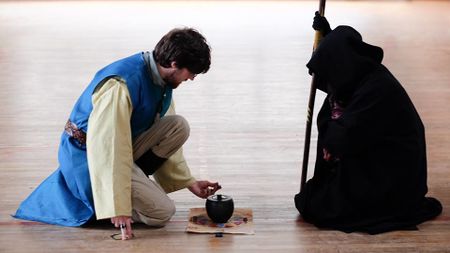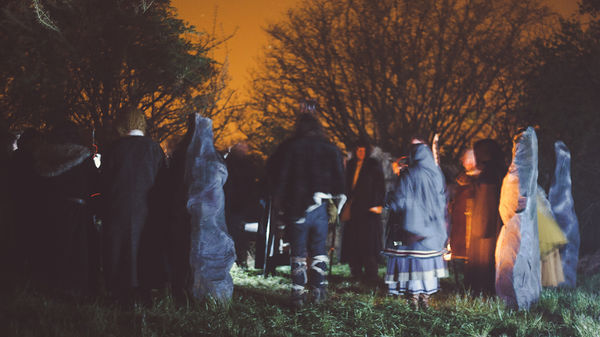Rituals
Overview
Rituals are powerful magical spells that magicans can learn to perform by buying lore in one or more of the six realms. There are many more rituals than spells and most are much more powerful but they take longer to perform and can only be cast using crystal mana.
Some powerful rituals are too difficult for any one magician to perform alone. Magicians usually form covens to allow them to combine their skills to perform the most potent rituals.
Basic Rules
- Every ritual draws on one of the six realms
- Every ritual has a cost in crystalized mana to perform the ritual
- A ritualist may only expend mana up to their level of skill
- The regio at Anvil allows magicians to use one crystal more than their limit
- Crystalized mana expended by a character who has mastered the ritual counts double
There are six magical realms, which the Empire call Day, Night, Spring, Summer, Autumn and Winter. Every ritual draws its power from just one of these six realms. You must have a rank of the appropriate Realm lore to attempt a ritual of that realm.
All rituals require crystalized mana (from a mana site) to cast, they are too powerful to perform with personal mana. The magnitude of the ritual is the amount of crystal mana needed to perform it. The amount of crystalized mana that each ritualist can expend is limited by their level of skill with the appropriate realm lore.
Magicians can master a handful of formulaic rituals. Crystalized mana used by a character that has mastered the ritual counts double. Magicians may choose to master formulaic rituals when they purchase realm lore skills or the extra ritual skill.
E.g. A magician is performing the ritual, the Ascetic Star of Atun, a magnitude 6 Day ritual. The ritualist has three levels of skill in day lore, allowing them to contribute three points of crystalized mana, however the caster has mastered the ritual, doubling their effective mana. This allows them to achieve the 6 points required for the ritual.
A regio is an area with a magical aura. Most regios are keyed to one of the realms and some are powerful enough that they that make it easier for ritualists to perform rituals of that realm while inside it. There is a powerful permanent regio of all six realms at Anvil that allows each magicians contributing to the ritual to use one mana crystal more than normal, if they have at least one rank of the relevant realm lore already.
For example, A coven of three characters each with one rank of Summer lore use the anvil regio. They each act as if their Summer lore were rank 2 and can contribute 2 crystal mana to the ritual. A fourth member of their coven who has no ranks in Summer still cannot contribute to the ritual.
| Ritual Summaries |
| Spring rituals |
| Summer rituals |
| Autumn rituals |
| Winter rituals |
| Day rituals |
| Night rituals |
Realms
- Every ritual is keyed to a single realm
All the rituals in Imperial Lore are keyed to a single realm. You can only attempt to cast that ritual if you have sufficient skill with that realm lore. Some ritual effects can be duplicated by clever use of the magic of another realm, but there is usually a steep cost to do this. Each realm has its own strengths and weaknesses and most formulaic rituals have been formulated using the best realm to produce that effect.
Each realm has a summary of the rituals associated with it, stating the name, basic effect and magnitude. These summaries are linked on the right. There is also a simple but complete list of every ritual that is part of Imperial Lore available.
Performing a Ritual
- Rituals require several minutes of appropriate roleplaying; it should be obvious to everyone nearby that you are performing a ritual
- You cannot perform rituals while wearing armour
- If possible, you should get a ref before performing your ritual
Rituals require several minutes of appropriate roleplaying. Imperial magicians use a number of different sources, symbols, methods and theories when designing their rituals. The most common magical techniques are; Rune magic, Dramaturgy, Astronomancy and the Music of the spheres. These represent bodies of magical lore and theory that can be used to add depth and significance to all magic, and have special resonance for ritual magic. In addition, the description of each ritual includes a Common Elements section that can be used as a starting point for developing the roleplaying required to perform a ritual.
It should be obvious to everyone nearby that you are performing a ritual. While it is possible to conceal precisely what your ritual is intended to achieve, it is against the spirit of ritual magic to intentionally perform a ritual that appears to have an opposite effect. For example, performing a ritual that looks as if it is intended to heal someone that is actually intended to destroy one of their magic items is inappropriate.
We do not mark your performance in a ritual, but we do log every ritual, so that we can record and apply the effects. You should try and get a ref before you perform a ritual if possible, so that they can log the ritual.
Formulaic Rituals
- Ritualists can perform any formulaic ritual if they have the ranks to do so
The Imperial Conclave has helped to spread the knowledge of countless different magical rituals across the Empire. This list of formulaic rituals is referred to as the Imperial Lore. Any Imperial magician can perform a formulaic ritual that is in Imperial Lore if they have sufficient ranks in the appropriate realm. In addition a ritualist may choose to master a number of formulaic rituals - this makes those rituals much easier and cheaper to cast.
Spontaneous Magic
- Ritualists can attempt to create spontaneous magical effects
It is possible to create a magical effect at an event that is not part of the existing library of known Imperial rituals. Spontaneous magic is expensive and takes much longer to prepare than an equivalent formulaic ritual.
Battlefield rituals
- Battlefield rituals can be cast on the battlefield without a referee present
Many rituals do not require a referee to cast on the battlefield. This is a special exception which exists for a subset of rituals to make it as easy as possible for magicians to perform their rituals on battlefield without needing to find a referee first. Only a battlefield ritual can be performed in this way and you must follow the additional rules when casting without a referee present.
Covens
- A coven of ritualists can combine their skills to perform a ritual together
A ritualist can always perform a ritual by themselves. Most ritualists are also part of a coven, a mystical union that extends the hearth magic of oaths to allow participants to combine their strength.
Members of a coven can work together to perform a ritual with each participant contributing mana to a ritual up to the normal limit of their ability.
Mastery
It is not uncommon for some members of a coven to have mastered an Imperial formulaic ritual while others have not. In this case only the mana contributed to the ritual by the magicians who have mastered the ritual is doubled.
Contributors
Some rituals refer to contributors. A contributor is a character who is a member of the coven performing the ritual and has at least one rank of the realm lore used by that ritual.
Imperial Lore
Imperial lore is a library of known rituals that is shared by all Imperial magicians. Even where an Imperial citizen has not mastered a ritual that is part of Imperial lore, they can still try to perform it - wheras new effects that are not part of Imperial lore require the creation of an arcane projection or access to a ritual text. The Imperial Conclave has the ability to add new rituals to this body of knowledge through the Declaration of Imperial Lore. Doing so requires access to the appropriate ritual text, which is "used up" during the process of making the ritual part of Imperial Lore.
Creating a new ritual is a significant undertaking. In pre-Imperial times it might take decades to formulate even a simple ritual so it could be mastered. The Empire created titles such as the Dean of the Lyceum and Provost of the Halls of Knowledge to help co-ordinate the research efforts of many disparate magicians to speed the process of formulating new rituals. Once a new ritual is created, however, it is the property of the person who oversaw the research. It exists only in the form of a ritual text which is a special item that contains all the information needed to master the ritual. Unless a ritual is formally added to the body of Imperial Lore, only someone who has the physical ritual text can master it.
Any character can master a ritual that is part of Imperial lore, either by spending experience points during downtime or by studying at an event. A ritual that is not part of Imperial lore, even if it was been codified or formulated (for example by the Dean of the Lyceum or the Provost of the Halls of Knowledge) cannot be mastered freely. Instead, the character must use a ritual text that contains the details of that ritual.
Further Reading
- Overview
- Spellcasting
- Rituals
- Magic Items
- Herbs & Potions
- Cosmology

